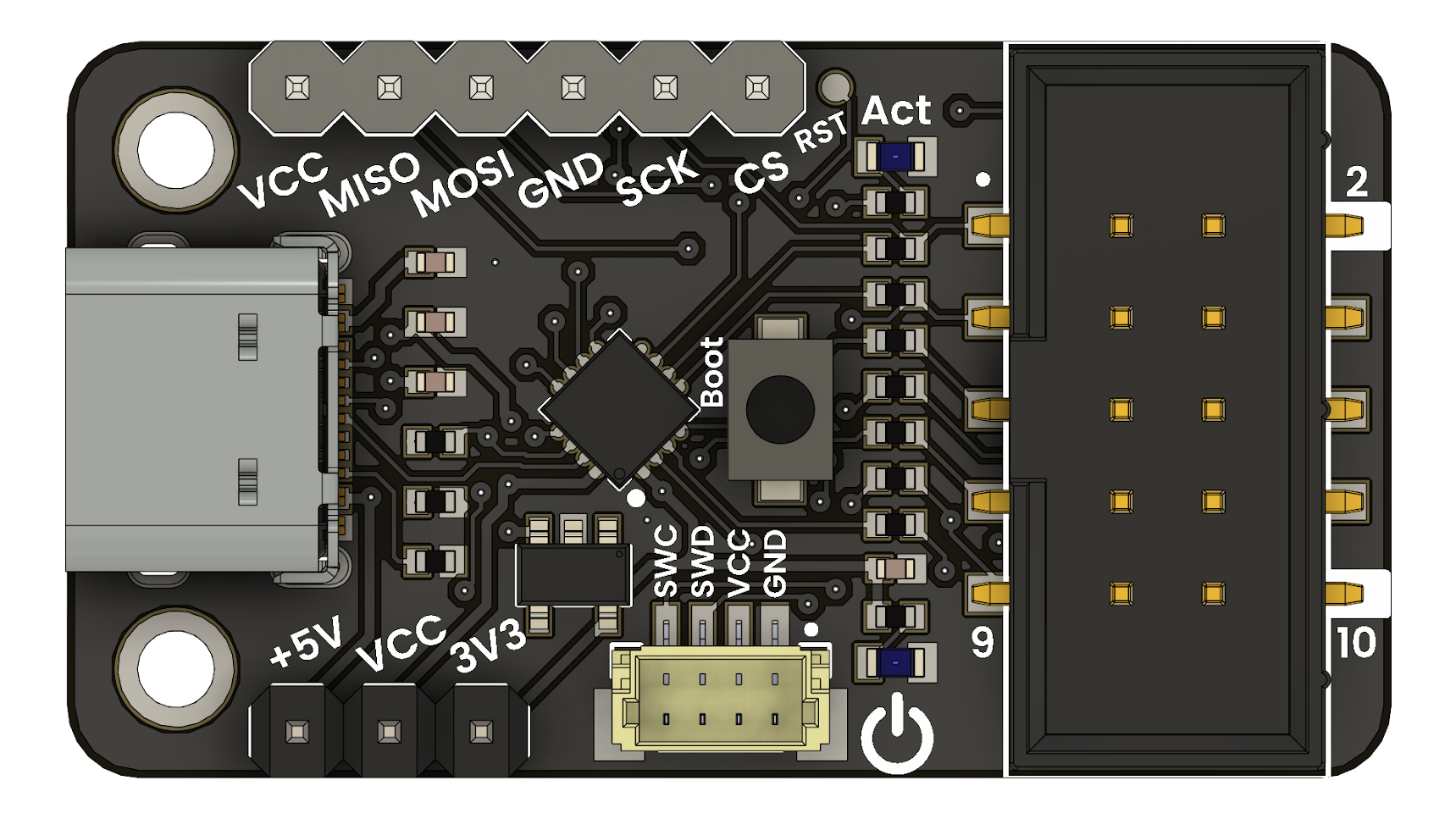Multi-Protocol Programmer





Resources
| Resource | Link |
|---|---|
| Wiki | Development Boards Wiki |
| Documentation | unit_multiprotocol_programmer_platform |
| Getting Started | Initial Setup |
| Schematic & PCB | Hardware Files |
| Firmware & SDK | SDK & Firmware |
| Main Repository | GitHub Repo |
Firmware Required
This programmer requires specific firmware depending on the protocol:
- AVR: USBasp & UPDI
- ARM: CMSIS-DAP (SWD/JTAG)
- CPLD: USB-Blaster (JTAG)
Load the correct .bin before use. Without it, the device won't function properly.
Overview
The Multi-Protocol Programmer is a USB tool based on the CH552 microcontroller. It supports flashing and debugging of:
- AVR microcontrollers (ATmega, ATtiny, AVR-DA)
- ARM Cortex-M devices (STM32, nRF52, SAM, etc.)
- Intel/Altera MAX II CPLDs (EPM240, EPM570, etc.)
Features
- USB Full-Speed (CDC/HID)
- Voltage selector: 3.3V / 5V
- SWD / JTAG / UPDI / USBasp support
- Works with popular tools (avrdude, OpenOCD, Quartus, etc.)
PY32F0xx Configuration
The Multi-Protocol Programmer is fully compatible with PY32F0xx microcontrollers when using the CMSIS-DAP firmware.
Testing Status & Recommendations
Tested Devices ✅
- PY32F003x4 - Fully verified with this programmer
- PY32F003x8 - Fully verified with this programmer
Recommended for Testing 🧪
For the following devices that are supported in code but need hardware verification:
- PY32F030 series (all variants)
- PY32F002A series
- PY32F002B series
This programmer is the recommended solution for testing these untested device variants.
Setup for PY32F0xx
-
Flash CMSIS-DAP Firmware:
python3 tools/chprog.py firmware/cmsis_dap.bin -
Connect to PY32F0xx:
Programmer PY32F0xx ---------- -------- SWDIO ←→ PA13 SWDCK ←→ PA14 GND ←→ GND VTG ←→ VCC (3.3V/5V) RST ←→ NRST (optional) -
Set Correct Voltage:
- Use 3.3V for most PY32F0xx devices
- Check your specific device voltage requirements
Using with PyOCD
The programmer works seamlessly with PyOCD for PY32F0xx development:
# List connected devices
pyocd list
# Flash PY32F003
pyocd flash firmware.bin --target py32f003xx4
# Start GDB server
pyocd gdbserver --target py32f003xx4
# Interactive debugging
pyocd commander --target py32f003xx4
Using with OpenOCD
OpenOCD can also be used with the CMSIS-DAP firmware:
# Flash firmware
openocd -f interface/cmsis-dap.cfg -f target/py32f0xx.cfg -c "program firmware.bin verify reset exit"
# Start GDB server
openocd -f interface/cmsis-dap.cfg -f target/py32f0xx.cfg
Makefile Integration
Update your project Makefile to use the Multi-Protocol Programmer:
# Use CMSIS-DAP interface
PROGRAMMER = cmsis-dap
PROGRAMMER_ARGS = --target py32f003xx4
flash: $(BUILD_DIR)/$(EXAMPLE).bin
pyocd flash $(BUILD_DIR)/$(EXAMPLE).bin $(PROGRAMMER_ARGS)
debug: $(BUILD_DIR)/$(EXAMPLE).elf
pyocd gdbserver $(PROGRAMMER_ARGS) &
arm-none-eabi-gdb $(BUILD_DIR)/$(EXAMPLE).elf
Supported Protocols
| Firmware | Protocols | Target Devices | Interface | Tools |
|---|---|---|---|---|
| AVR | USBasp, UPDI | ATmega, ATtiny | CDC/HID | avrdude, Arduino IDE |
| CMSIS-DAP | SWD, JTAG | STM32, nRF52, PY32F0xx | HID+CDC | OpenOCD, PyOCD, Keil |
| CPLD | USB-Blaster | EPM240, EPM570, MAX II | HID | Quartus Prime |
Flashing Firmware
-
Enter Bootloader Mode:
- Hold
BOOT, plug USB, release.
- Hold
-
Flash Firmware:
python3 tools/chprog.py firmware/firmware_name.binOr use WCHISPTool on Windows.
Install Requirements
# Linux (Debian/Ubuntu)
sudo apt install build-essential sdcc python3-pip git
pip3 install pyusb pyocd
# Add user to dialout group for device access
sudo usermod -a -G dialout $USER
# Log out and back in for changes to take effect
For Windows: Download SDCC, Python 3, and Git.
Troubleshooting
Common Issues
-
Device not recognized? ➤ Check firmware & USB drivers (use Zadig on Windows for CMSIS-DAP)
-
Programming error? ➤ Verify voltage level (3.3V/5V), connections & cable quality
-
Slow upload? ➤ Reduce SWD/JTAG frequency or use shorter cables
PY32F0xx Specific
-
PyOCD can't find device?
# Check if programmer is detected pyocd list # Try different target specification pyocd flash firmware.bin --target py32f030xx4 -
SWD connection issues?
- Verify SWDIO/SWDCK connections
- Ensure stable power supply
- Try lower SWD frequency:
--frequency 1000000
-
Flashing fails?
# Try mass erase first pyocd erase --chip --target py32f003xx4 # Then flash pyocd flash firmware.bin --target py32f003xx4
Testing Contributions
Help expand device support! If you test py32f0xx-hal with untested devices using this programmer:
-
Test procedure:
- Flash basic examples (
blinky,serial_echo) - Verify peripheral functionality
- Document any issues or successes
- Flash basic examples (
-
Report results:
- Open GitHub issue with test results
- Include device model, programmer setup, and example outcomes
- Help us update the compatibility matrix
Firmware Selection Guide
For PY32F0xx development, use the CMSIS-DAP firmware:
| Target Family | Recommended Firmware | Interface | Tools |
|---|---|---|---|
| PY32F0xx | CMSIS-DAP | SWD | PyOCD, OpenOCD |
| STM32F0xx | CMSIS-DAP | SWD | PyOCD, OpenOCD |
| AVR | USBasp/UPDI | ISP/UPDI | avrdude |
| MAX II CPLD | USB-Blaster | JTAG | Quartus |
Performance Notes
SWD Frequency Settings
For reliable PY32F0xx programming:
- High-speed:
--frequency 10000000(10MHz) - for short cables - Standard:
--frequency 1000000(1MHz) - recommended default - Low-speed:
--frequency 400000(400kHz) - for problematic connections
Cable Quality
- Use short cables (< 15cm) for high-speed SWD
- Twisted pair for SWDIO/SWDCK reduces noise
- Good ground connection essential for reliable operation
License
- Hardware: CC BY-SA 4.0
- Firmware & Software: MIT License
- Third-party components: see individual
LICENSEfiles